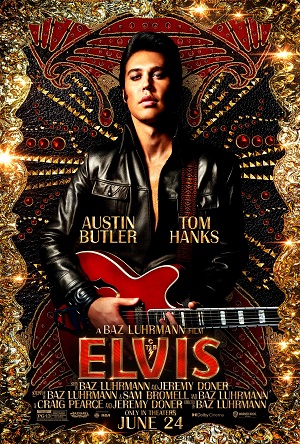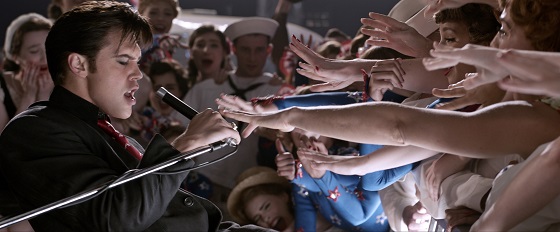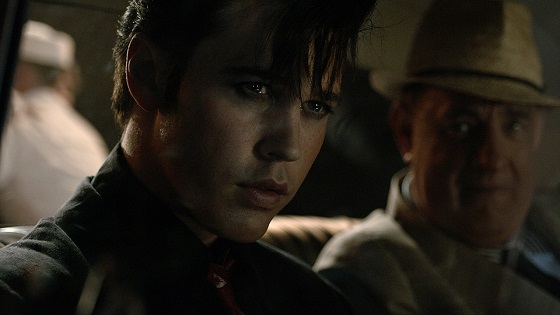

[Rating: Swiss Fist]
In Theaters Friday, June 24th
Even the people who aren’t all that familiar with Elvis Presley KNOW the guy, much like they might know John Wayne, Babe Ruth, or even Mark Twain. America is nothing if not a series of myths strung together, and every once in a while someone takes on (or is saddled with) the burden of the larger national mythos. In this way a person like Elvis can get absorbed into the bloodstream of a country, with the broader lessons of their life and what they represent acting as part of a grander, running conversation.
Maybe that’s why Elvis the movie doesn’t sit quite right, because even if it nails the look, feel, rhythm, and swagger of “The King” (Austin Butler), many of the details do not align with the widely accepted (and factual) understanding of this tale. Director Baz Luhrmann uses Elvis’ promotor/manager, Colonel Tom Parker (Tom Hanks), to tell the story in a way that streamlines everything, sure, but this also rips the guts out of what makes Presley so interesting in the first place. In this telling, Elvis is magnetic, charismatic, groundbreaking, and represents the best of America’s manifest destiny promise, yet he’s also almost Christ-like with his innocence, and is the victim, rather than the author, of his downfall.
For the first two-thirds of this thing, though, it’s at least a hell of a lot of fun. The script by Luhrmann, Sam Bromell, and Craig Pearce isn’t shy about jumping around in the story’s timeline to stir up the proper level of excitement and connect the thematic anchor points. It tracks Elvis’ rise and fall via the narration of Parker, who the movie pegs as an unreliable narrator up top, yet yields to because of his proximity to all the relevant action. Nothing more than a hayride country music promotor on the carnival circuit at the chronological start of this tale, Parker immediately sees the potential in the young music phenom and positions himself as the primary conduit through which all business with Presley is conducted.

Friends like B.B. King (Kevin Harrison Jr.) and wife Priscilla (Olivia DeJonge) caution Elvis against his continued collaboration with Parker throughout the picture, yet the promoter’s Svengali-like hold over Presley is firm. And while audiences and fans will find much of what occupies the first two-thirds of this movie both entertaining and familiar, the latter chunk (the uglier chunk), is less recognizable. Elvis’ relationships, feelings, personal growth (or lack of it), or any life outside of Col. Parker is M.I.A., here, and while the narrative conceit demands this up to a certain point, it removes Elvis from the movie bearing his name for quite a while.
Which is the problem, because despite the title, this film is really the Col. Tom Parker story. And…well, look: there aren’t any easy ways into this story, and hitching the script’s wagon to the one outsider who was there for 90% of Elvis’ notable journey seems to make sense, especially since it allows the story to conveniently side-step some ugly realities about the crooner’s life. Yet Elvis’ downfall, replete with hubris, addiction, paranoia, and excess, is what makes the man, his myth, and his enduring legend just that: enduring.
Elvis went from the most handsome, charismatic, and popular entertainer in the world to a laughable parody of himself in just 20 short years, and that story and its Icarus-like implications are now hardwired into America’s mythology. Although the career decline is indeed covered, Luhrmann and the movie deploy Parker as its author, and while there’s some truth to this, Elvis had a bevy of issues all his own. Removing this component of the story changes its very essence and is more than just bad history, it’s bad mythology.

Butler, so electric and vibrant throughout the best years of Presley’s life, is given precious little to do once the decline begins in earnest, and struggles to convey any sense of true character or agency in what is arguably the most important phase of the drama. And it is this wasted potential that serves as the movie’s greatest sin, because Butler’s performance as Presley up through the ’68 Comeback Special is LIGHTS OUT. Butler’s use of his body, the inflection of his voice, and the way the costumes, hair, and make-up hang off him all connect the actor to the genuine article in a way that transcends parody or impression.
And while the fact that Luhrmann isn’t precious with this material gets him into trouble on the back end, his willingness to dip into hip hop and guitar distortion music queues to communicate a sense of other-worldly danger to Elvis’ emergence is inspired. Likewise, the editing and cross-cutting early in the picture does an outstanding job of connecting Elvis’ music to its roots in the Mississippi and Tennessee African American communities, and is one controversial aspect of Presley’s life and career that is refreshingly well-served by the story.
So, it really is a mixed bag with Elvis, which is a shame for a lot of reasons, not the least of which is Butler’s stellar performance as the eponymous lead. There are moments in the film when the palpable excitement and novelty of what Elvis was doing, and what he represented to multiple generations of people, comes through with brilliant clarity: making the scenes that miss the mark all the more painful. Presley fans will quibble with many of the details (such as the timing of Elvis’ first hit of speed) while his detractors will rightly hold many whitewashed moments against the picture, but most everyone should agree that when Luhrmann gets the motor running on this movie, it’s hard not to go along for the ride, at least for a bit.





Comments on this entry are closed.